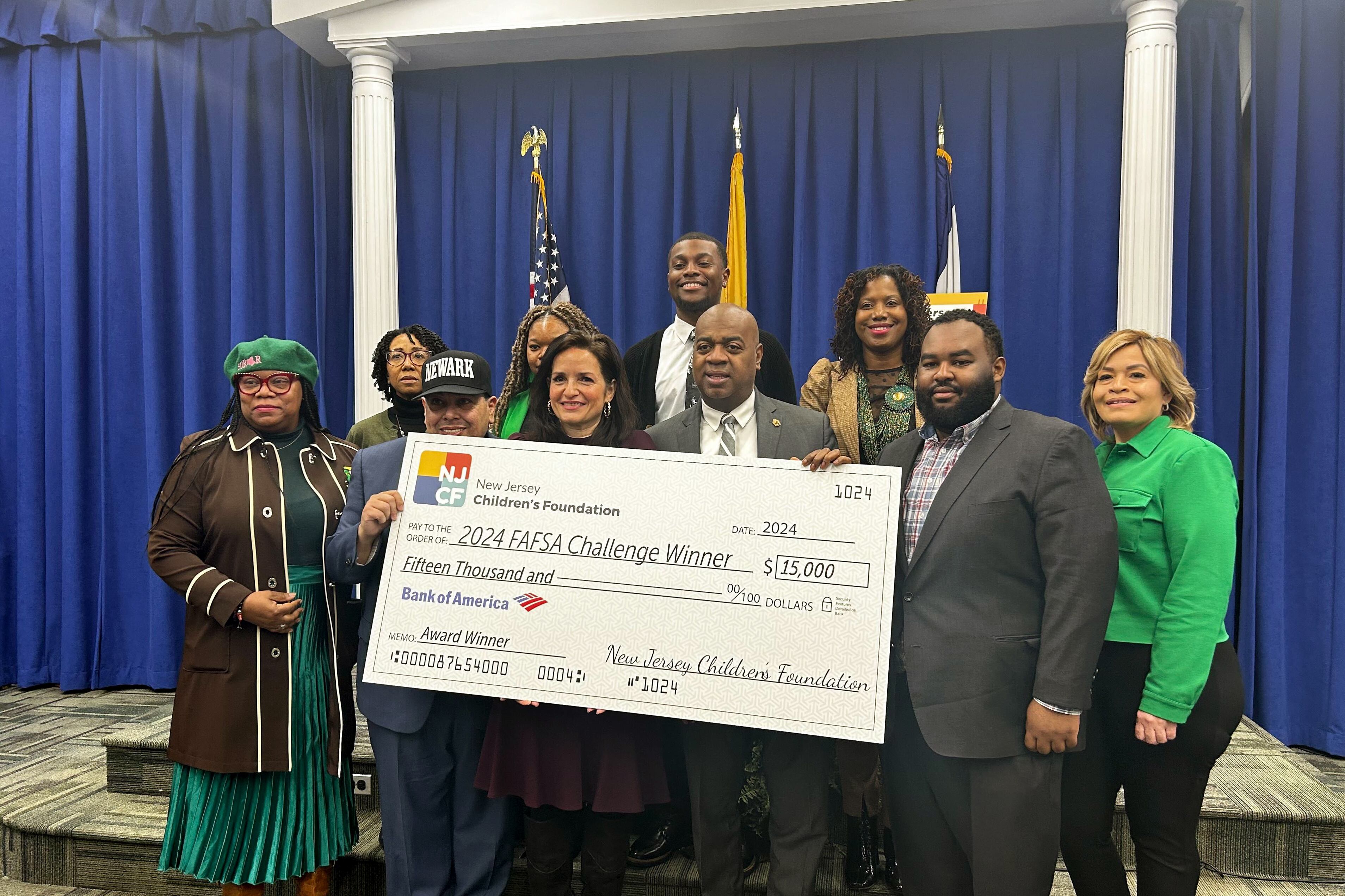Sign up for Chalkbeat Newark’s free newsletter to keep up with the city’s public school system.
Newark is going head-to-head against Camden in a first-ever competition to see which city can achieve the highest federal student aid application rate.
The city with the highest completion rate for the Free Application for Federal Student Aid form, or FAFSA, will receive a cash prize for their class of 2024 seniors and high schools, education leaders from both cities said Tuesday at dueling press conferences in Newark and Camden.
The friendly contest is meant to motivate students to pursue higher education, said Barbara Martinez, executive director of the New Jersey Children’s Foundation and sponsor of the competition along with the Camden Education Fund.
Newark Mayor Ras Baraka, a former teacher, wished students and families good luck during the press conference in his city as he teased Camden with “friendly competition.”
“This gives us an opportunity, in a fun way, to push our young people, push our teachers, our educators, the leaders of our institutions to get folks to work,” Baraka said.
In total, $70,000 will be awarded to high schools in both cities with the New Jersey Children’s Foundation and the Camden Education Fund each contributing $30,000 in prize money for the schools with the highest completion rates in their respective cities. In addition, the organization in the losing city will pay an extra $10,000 to the winning city’s organization to be distributed to participating schools.
Newark, New Jersey’s largest school district, made completing the FAFSA application a graduation requirement in 2022. State leaders are hoping this year’s seniors will tap into federal funds by requiring that high schools in the state provide graduating seniors with the FAFSA form before they receive their diplomas.
Gov. Phil Murphy signed that mandate into law last week. It applies to high school juniors this school year who will be required to fill out the form online when it becomes available in October 2024. Other states, including Louisiana and Illinois, also have similar requirements.
FAFSA is the only way students can apply for federal financial aid, Pell Grants for low-income families, state aid packages, work-study programs, and money directly from colleges. Graduating seniors who are undocumented must complete the New Jersey Alternative Financial Aid Application (HESAA).
FAFSA helps many states and colleges determine financial aid for qualifying students, but tens of thousands of dollars go unclaimed yearly for undergraduate and associate degrees and technical or career schools.
Newark Superintendent Roger León, who was at the press conference in Newark, said getting students to complete their application is part of the district’s “ongoing process” to ensure students are financially prepared for college, trade school, or other eligible certificate programs. The district is also working to provide information to students and families about FAFSA, the most critical part of their work in this process, León added.
“Obviously, the Office of Student Life, which was created in 2018, when I started, is a big part of the catalyst of making sure that students are aware of different scholarship opportunities that are available,” León said
During Tuesday’s press conference, Macai Fields, an Eagle Academy graduate and senior at Saint Elizabeth University, said he felt thankful he learned about FAFSA and completed the form despite how overwhelming it seemed. Currently, he works with Eagle Academy seniors to help them navigate the process.
“When I was in their shoes looking for schools, I quickly realized that the cost of tuition and other expenses could be quite overwhelming,” Fields said. “But FAFSA provided a sense of relief by helping me understand that financial aid was available based on my family resources and circumstances.”
Shayaka Wilson, a West Side High School alum and 2022 Rutgers University graduate, said as a first-generation college graduate and immigrant, she knew how important it was to get that aid. Wilson always knew she wanted to go to college, but when she first moved to the country, she was concerned about how she would be able to afford it without taking on significant debt.
“I know there are families here in the city who have a similar concern as I did and they think college is out of reach or not even an option,” Wilson said. “I want you as a young person to think of it as an application that the government uses to determine your family’s financial strength and whether they would be able to fund your college education.”
In New Jersey, roughly $92 million in unclaimed Pell Grant money was left on the table by the class of 2022, according to data from the Washington D.C.-based nonprofit, National College Attainment Network. In 2021, roughly $90 million was left by Garden State graduating seniors, according to the same data.
In 2022, the state’s graduating class had a 57.4% FAFSA completion rate. But rates vary among cities, states, and school districts – with the lowest performing below 50% and the highest over 70%, according to a Rutgers University Cornwall Center report.
As of 2022. 24.9% of Newark residents aged 25 and older hold an associate degree or bachelor’s degree, said Robyn Brady Ince, executive director of the Newark City of Learning Collaborative, during Tuesday’s press conference. She said initiatives such as the FAFSA contest “will provide what we need to galvanize more people toward achieving those goals.”
The winner of the competition will be announced in April and results will be uploaded on a tracker online daily, Martinez said.
This year, the FAFSA process opened on Dec. 31 rather than Oct. 1 after the U.S. Department of Education said the delays were due to the launch of a shorter, more simplified version of their form now called the Better FAFSA.
Jessie Gómez is a reporter for Chalkbeat Newark, covering public education in the city. Contact Jessie at jgomez@chalkbeat.org.






